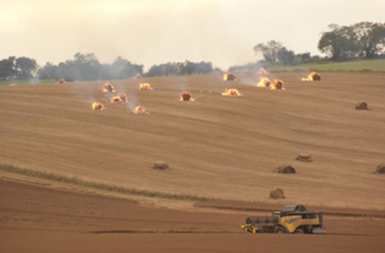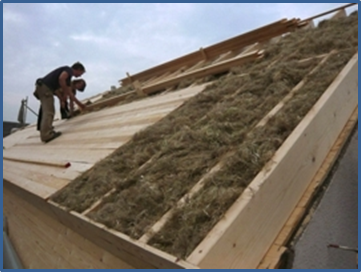Decent work and economic growth
Responsible consumption and production
Partnerships for the goals
Coordinator: Sachsen-Leinen e.V.
Contact Person: Dipl.-Ing. agr. Torsten Brückner
Address: August-Bebel-Straße 2, 04416 Markkleeberg
Phone@tel
Email: @email
Project partners:
- Temafa Maschinenfabrik GmbH, Bergisch-Gladbach
- Kluge GmbH, Königswartha
- Hanffaser Uckermark eG, Prenzlau
- Leibniz-Institut für Agrartechnik und Bioökonomie e.V., Potsdam (ATB)
- Maschinen- und Systementwicklung Dr. René Thielicke, Halle
LINOKAS - Coupled Use of Linseed and Fibre Straw
Both the building materials industry and the automotive industry are seeing an increasing demand for environmentally friendly, natural raw materials. In Kazakh linseed cultivation, linseed straw is produced as a by-product, which can then be processed into a raw industrial fibre material. Up to now, however, this raw material has remained largely unused for economic purposes. The German-Kazakh project LINOKAS is therefore developing a cost-reduced and thus economically viable treatment process for linseed straw and testing on-site processing stages.
From problem substance to raw material
Kazakhstan has become one of the world's most important producers and exporters of linseed in recent years. The continental climate is very well-suited to linseed cultivation. At the same time, the integration of the additional linseed crop is allowing for the loosening of crop rotations which were previously dominated by spring wheat.
However, the fibrous, hard-to-decompose stalk material of the linseed (straw) causes big problems for farmers when sowing the following crop after the winter. The linseed straw is currently burned in an uncontrolled manner on a large part of the cultivation area.

Within the framework of LINOKAS, German and Kazakh partners from agriculture, industry and research are developing specially adapted processes over three years to produce an industrially usable raw fibre material and, for example, a construction product from the currently "problematic" agricultural product of linseed straw. In cooperation with partners in Kazakhstan, a cultivation method is to be developed for the simultaneous, i.e. coupled, use of linseed for the production of high-quality seeds and raw fibre materials. This work is being supported by German project partners for the adaptation of technology for the harvesting and recovery of straw. Taking these findings into account, the German side is developing a technology for the treatment of linseed straw which is adapted to regional conditions. The aim is to create the conditions in the target region for producing and marketing a transportable raw fibre material for export or processing into an innovative insulating material for agriculture-related added value.
Sustainable resource use
Variety and cultivation trials by the Kazakh partners are allowing for a targeted selection of linseed varieties and a corresponding adaptation of the entire cultivation process to the requirements of the coupled use of seeds and straw. These experiments will be repeated in the second and third year of the project to be able to take account of seasonal influences. In addition to native varieties, European linseed varieties will also be tested. Straw resulting from the harvest will be subjected to storage trials and then processed using specific laboratory methods. The resulting fibre quality will also be evaluated. At the same time, comparative technical trials will be carried out with harvest biomasses from agricultural cultivation. This will result in fundamental insights into the development, design and manufacture of essential components of the processing plant planned for implementation in Kazakhstan. Finally, easy-to-process blow-in insulation made of linseed is to be developed, and options and technical concepts for corresponding application are to be tested.
The practical relevance of the project results from the fact that special cultivation of fibre plants will not compete for surface space with food or fodder crops,
as the raw material of fibre straw is already obtained from linseed cultivation. The solution to a previously eminent environmental problem can even lead to additional revenue for linseed farmers after successful fibre extraction and processing into intermediate and end products.
Implementation prospects
After selection both for the seed and straw harvest of suitable linseed varieties, an appropriate cultivation system for coupled use will be available and it will be possible to integrate it into the existing crop rotation in Kazakhstan. After quality-oriented interim storage of the fibrous raw material, it will be processed on-site into a transportable or processable intermediate product using a new decortication technique. This will create additional employment and income opportunities in direct connection with agricultural production in Kazakhstan. In addition to the direct partnerships in the research project, multiplication effects are expected in other regions with a corresponding increase in export opportunities for the German engineering partners.

The German building materials sector and automotive industry are increasingly interested in natural, environmentally friendly raw materials and natural fibres. Flax, hemp and imported fibres are already being used, for example for the production of automotive interior trim. Flax fibres already in use are currently obtained from the genetically similar fibre flax, which, however, is subject to the price influences of the textile industry due to its popularity. LINOKAS therefore considers substitution or supplementation with linseed fibres in current production realistic.
